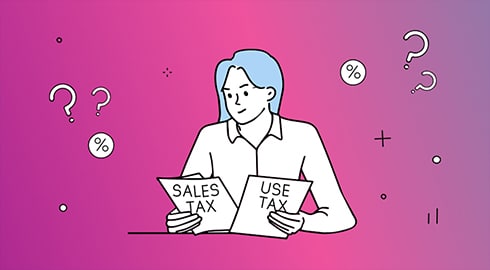The bigger the sale, the bigger the sales tax cut, right? Well not necessarily.
When it comes to wholesale sales, exemptions help sellers and buyers maintain a fair and sustainable market by charging sales tax only when it’s due.
In this blog post, we will delve into the world of wholesale sales tax, discussing why there is no sales tax on wholesale sales, the documentation required for wholesale sales, how to keep track of reseller certificates, and why automated sales tax software is the answer to wholesale compliance.
Why is there no sales tax on wholesale sales?
Sales tax is there to ensure that end-users contribute to the state budget. But when your buyer is another link in the supply chain and not the end, that responsibility doesn’t lie with them.
So when a wholesaler sells to a retailer or reseller, where the buyer is not the end-user, the wholesaler is not required to collect and remit sales tax on the transaction.
This exemption exists because the responsibility to collect sales tax is typically placed on the final seller of the product. Wholesalers facilitate the distribution process by selling in bulk to retailers, who then sell the products to the end consumers.
What documentation is needed for wholesale sales?
Your wholesale license is just the start of the paperwork because determining what documentation is required for wholesale tax exemption is a process all by itself. And it’s determined by one vital aspect: your company’s physical tax nexus.
Because wholesale orders are exempted from sales tax, it’s easy to write the whole process off and forget about it. But to stay compliant with tax regulations, you need to be able to prove you exempted the right sales.
To prove that, you need to collect exemption certificates in the states where you have a sales tax nexus.
Now for wholesalers, there are two vital physical presence considerations that go beyond the location of your primary base of operations: remote employees and trade shows.
The people who promote your brand in other states and don’t need to reside in the same state as the company’s offices can instantly trigger a physical presence for your company in a state with vastly different sales tax regulations than the one you’re situated in.
Trade shows are a primary source of networking for wholesalers and offer sellers valuable opportunities to connect with new clientele. But if you’re doing business at an out-of-state trade show, you need to be aware of the sales tax regulations of that state, because (yes, you’ve guessed it) trade shows count as physical presence.
Once you’ve established a physical presence in one of these ways (in addition to the traditional physical nexus), you need to determine the sales threshold for the applicable states to see if you have a nexus there. If a nexus has been created, you need to collect reseller certificates for each wholesale sale that is exempt from sales tax.
How to keep track of reseller certificates
Reseller certificates play a crucial role in wholesale sales tax compliance. But managing a multitude of these documents for every sale can get tricky.
That’s why it’s important to keep track of reseller certificates at all times by following a holistic management approach.
Create a systematic process
Establish a systematic process for collecting, organizing, and storing reseller certificates. This could involve developing a digital system or using specialized software to maintain an organized record of certificates received.
Regularly review and update certificates
Periodically review the validity of reseller certificates to ensure they are up-to-date and reflect the current status of the retailers’ resale activities. This helps you maintain compliance and avoid potential issues during tax audits.
Why automated sales tax software is the answer to wholesale compliance
Sales tax compliance isn’t a walk in the park if you go it alone. But it can be.
Complyt lets you enter the world of automated sales tax compliance with ease, enabling you to change the way you manage wholesale sales tax compliance forever.
Streamlined tax calculations and reporting
Complyt’s automated sales tax software simplifies the complex calculations involved in determining sales tax obligations for wholesale transactions and reseller certificate management. It automates the process, ensuring accurate tax calculations and sales tax collections, reducing the risk of exposure at every step.
Centralized recordkeeping
With automated software, you can maintain a centralized database of exemption certificates, making it easy to access and update the necessary documentation when needed. By letting you manage your certificates on a centralized dashboard, Comply eliminates the hassle of managing physical copies and reduces the risk of misplacing or losing important certificates.
Enhanced compliance and risk management
Automated sales tax software helps you stay compliant with ever-changing tax regulations. It can alert you to changes in tax rates and thresholds, ensuring you apply the correct taxes to your wholesale sales. This reduces the risk of non-compliance penalties and audits.
Make your wholesale journey so much more efficient with Complyt
Understanding sales tax when buying and selling wholesale is essential for both wholesalers and their customers. And when you work with a software company that’s as experienced in the field of wholesale sales tax as we are, your compliance journey is a piece of cake. Book your free demo today to see how we can help your business.









